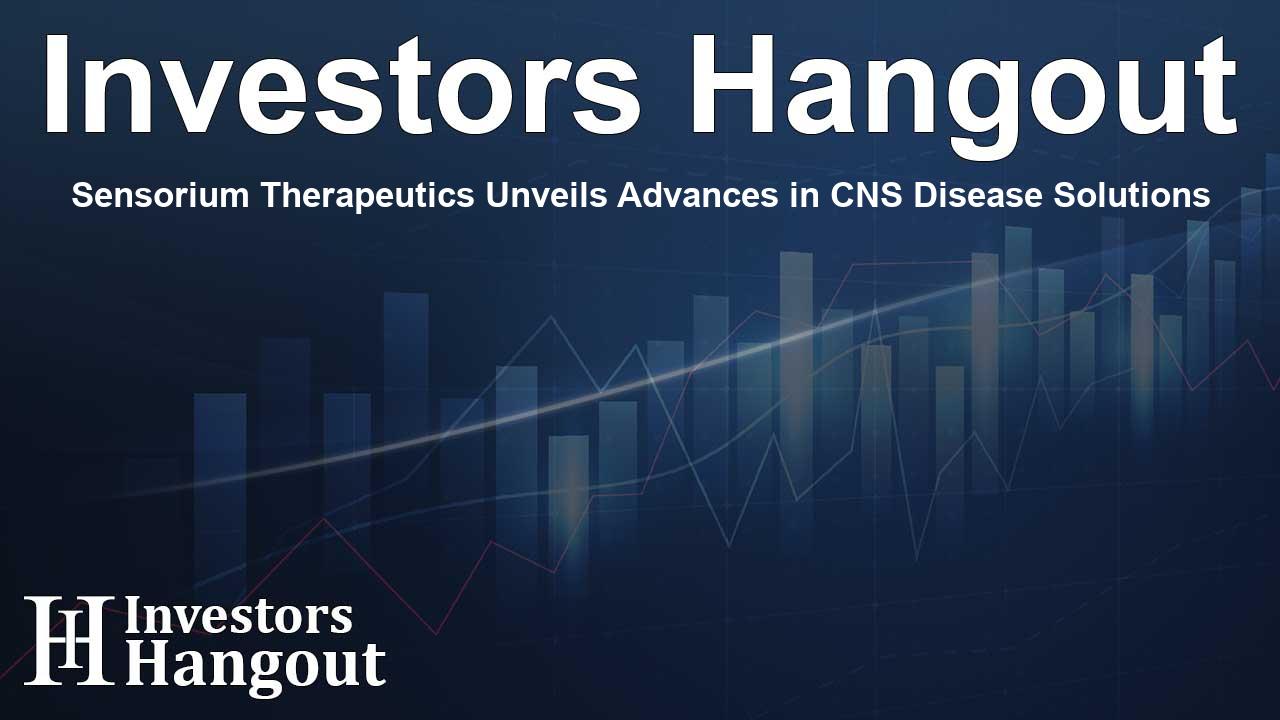Sensorium Therapeutics Unveils Advances in CNS Disease Solutions

Sensorium Therapeutics Unveils Advances in CNS Disease Solutions
Sensorium Therapeutics, a groundbreaking biotechnology firm specializing in central nervous system (CNS) treatments, has made significant progress in developing innovative medicines aimed at addressing anxiety disorders and epilepsy. They've recently presented promising preclinical data for their lead programs at a major neuroscience conference.
Details on the Lead Programs
The company showcased two of their flagship products: SENS-01, a fast-acting anxiolytic designed to alleviate anxiety disorders, and SENS-03, a medication targeting focal onset seizures in patients resistant to current drug therapies. Their presence at the Neuroscience 2024 event highlighted not only the efficacy of these drugs but also the unique capabilities of their Biodynamic Discovery Platform™.
Harnessing Advanced Drug Development Techniques
Sensorium's approach is built on an innovative framework that combines medicinal chemistry with advanced neuronal screening and machine learning technologies. This integration is tailored to discover first-in-class CNS drugs inspired by natural compounds, with substantial evidence supporting their safety and efficacy through previous human trials.
CEO Insights and Future Directions
CEO of Sensorium, Dr. Alexandra Glucksmann, expressed excitement about the data presented, viewing it as a validation of their strategic drug discovery approach. She highlighted the company's commitment to tackling unmet clinical needs with their unique methodologies.
Advancements in SENS-01 Program
The SENS-01 program focuses on a synthetic derivative of a natural compound that has shown effectiveness as a rapid-onset anxiolytic. Through meticulous studies, it has proven to possess excellent characteristics suitable for CNS treatment and a favorable safety profile. The company is currently finalizing investigational new drug (IND) enabling studies, gearing up for clinical trials slated to begin in early 2025.
Combatting Epilepsy and Anxiety with SENS-03
SENS-03 stands out in its ability to not only control seizures but also manage concurrent anxiety, which affects a remarkable 80% of individuals dealing with drug-resistant epilepsy. The program has demonstrated efficacy through various validated models, indicating a strong potential to evolve into a development candidate in the near future.
Key Findings from Neuroscience 2024
During the conference, several key presentations captured the essence of Sensorium's progress:
SNTX-AXN Presentation Highlights
Presented by Dr. Jeffrey Brown, the findings illustrated that the development candidate for anxiety is a small molecule designed specifically to enhance the rapid onset of its anxiolytic effects. It boasts a unique pharmacological profile distinct from existing treatments, supported by both in vitro and in vivo research.
Insights from AI-Driven Discovery
Another significant presentation emphasized how Sensorium’s AI-driven product engine has identified a novel natural compound that possesses both anxiolytic and anti-epileptic properties. The preclinical data affirms its efficacy, highlighting a mechanism of action that diverges from the conventional therapies presently on the market.
About Sensorium Therapeutics
Sensorium Therapeutics is dedicated to transforming the treatment landscape for CNS diseases. Through their Biodynamic Discovery Platform™, they merge the complexities of nature with cutting-edge science to create effective neuropsychiatric medications. Their commitment is clear in their mission to innovate and introduce drugs like SENS-01, aimed at enhancing the lives of those facing the challenges of anxiety disorders and epilepsy.
Frequently Asked Questions
What is Sensorium Therapeutics focused on?
Sensorium Therapeutics specializes in developing novel therapies for CNS diseases, particularly targeting anxiety disorders and epilepsy.
What are SENS-01 and SENS-03?
SENS-01 is a fast-acting anxiolytic, while SENS-03 is a medication that addresses both seizures and related anxiety, specifically for drug-resistant epilepsy patients.
When will Sensorium enter clinical trials?
Sensorium is preparing to start clinical trials for SENS-01 in early 2025 after completing IND-enabling studies.
How does Sensorium use AI in their research?
Sensorium employs AI to enhance their product discovery process, identifying compounds that have therapeutic potential based on extensive data analytics.
What is the Biodynamic Discovery Platform™?
This platform integrates advanced technology and methodologies in chemistry and neuroscience to facilitate the discovery of innovative CNS medicines.
About Investors Hangout
Investors Hangout is a leading online stock forum for financial discussion and learning, offering a wide range of free tools and resources. It draws in traders of all levels, who exchange market knowledge, investigate trading tactics, and keep an eye on industry developments in real time. Featuring financial articles, stock message boards, quotes, charts, company profiles, and live news updates. Through cooperative learning and a wealth of informational resources, it helps users from novices creating their first portfolios to experts honing their techniques. Join Investors Hangout today: https://investorshangout.com/
Disclaimer: The content of this article is solely for general informational purposes only; it does not represent legal, financial, or investment advice. Investors Hangout does not offer financial advice; the author is not a licensed financial advisor. Consult a qualified advisor before making any financial or investment decisions based on this article. The author's interpretation of publicly available data shapes the opinions presented here; as a result, they should not be taken as advice to purchase, sell, or hold any securities mentioned or any other investments. The author does not guarantee the accuracy, completeness, or timeliness of any material, providing it "as is." Information and market conditions may change; past performance is not indicative of future outcomes. If any of the material offered here is inaccurate, please contact us for corrections.